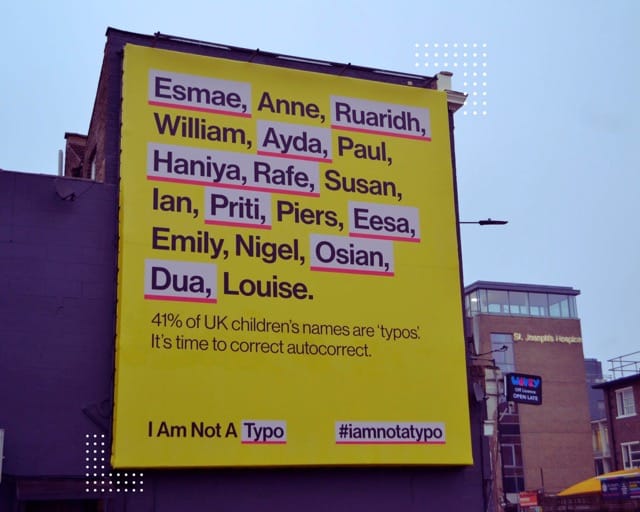‘I am not a typo’ Campaign Challenges Tech Giants to Update Harmful Systems to Reflect our Multicultural Society
Names deemed ‘typos’ include ones of African, Asian and Eastern European origin

Access the Audio Read version of this article directly on Spotify for Podcasters.
“It’s like saying that it’s not just your name that’s wrong, but you are.”
Did you know that 41% of the names of the babies born in England and Wales were ‘typos’? The shocking revelation was made this week by ‘I am not a typo’ (IANAT), a new campaign calling on tech giants to “correct autocorrect and spell-check spell-check”.
The collective looks at the link between identity and technology and has undertaken research into baby names in the UK to demonstrate how the tech systems we use should be more inclusive and reflective of our multicultural society.
Across all girls and boys names given to children in England and Wales in 2021, 5,492 out of 13,532 were underlined as ‘wrong’ (with a minimum of three occurrences), as shown in testing conducted on Microsoft’s English dictionary (UK) and using the most recent data on baby names released by the Office of National Statistics. These names include many of African, Asian and Eastern European origin, but also popular Scottish, Welsh and Irish names.
Alongside a billboard campaign calling for the tech giants to correct autocorrect, IANAT has published an open letter to the big technology owners, highlighting the example of the name ‘Esmae’.
“Esmae – all 398 of her born in England and Wales in 2021 – is wrong, apparently,” the letter writes. “Same for the 447 born in 2020, 501 born in 2019, 480 born in 2018 and 502 born in 2017. That’s 2,328 in the last five years. That’s compared to 36 instances of the name Nigel in that time.”
Out of 7,330 names given to girls in 2021 in England and Wales, 3,079 were ‘typos’, according to that same Microsoft Word dictionary. Analysing names given to boys in England and Wales in 2021, IANAT revealed that 39% of them were flagged as ‘typos’.
Supporting the ‘I am not a typo’ campaign, Professor Rashmi Dyal-Chand of Northeastern University in the US, author of the paper Autocorrecting for Whiteness, said: “My name is Rashmi, not Rashi, Rush me, or Sashimi, autocorrect notwithstanding. For people with names like mine, autocorrect is not convenient and helpful. It is unhelpful. And yes – it is harmful.”
Writer and journalist Dhruti Shah, who has covered the issue extensively, also shared her views: ‘My name is Dhruti. Not Drutee, Dirty, or even Dorito. And yet these are all words my name has been changed to, often because of an autocorrect decision or a rushed message… My first name isn’t even that long – only six characters – yet when it comes up as an error or it’s mangled and considered an unknown entity, it’s like saying that it’s not just your name that’s wrong, but you are.’
This isn’t the first time autocorrect is used in creative campaigns advocating for social change. Last year, the ‘Autocorrected Pay Gap’ national campaign run by not-for-profit People Like Us used real autocorrect cases on people’s names to highlight subconscious bias, linking it to the pay gap between ethnicities and highlighting the dangers of misidentification and the sense of exclusion it triggered for individuals with diverse names.
The IANAT billboards are currently running thanks to the generosity of media owners donating the ad space and funding the production of the installation - but the campaign and open letter can be found on https://www.iamnotatypo.org/





